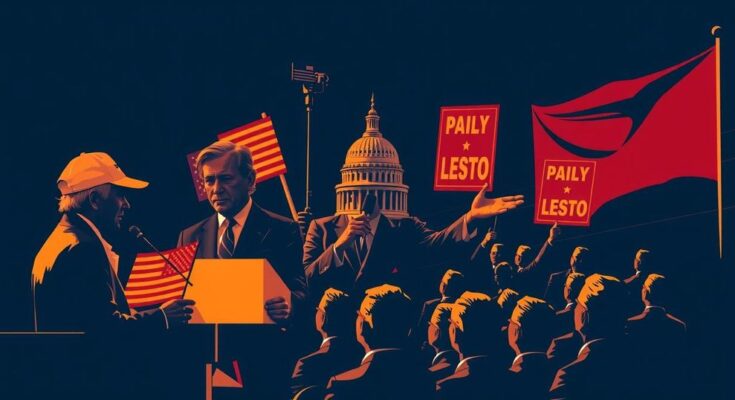The Left’s rhetoric of moral superiority fosters division, alienating potential voters like Trump supporters. Figures like Obama exacerbate this issue through shaming, leading many to gravitate toward Trump as an antidote to moral scrutiny. The Democrats’ disconnection from working-class realities raises questions about their identity as the “party of the people.” To mend this rift, the Left must embrace inclusivity and humility, reshaping its narrative to foster genuine engagement and representation.
In the aftermath of Trump’s resounding triumph in the 2024 presidential election, a powerful image emerged from Kamala Harris’s Instagram—her standing before a darkened arena, surrounded by the flickering lights of supporters. While she offered a message of resilience, the metaphor of light versus dark provoked concern. This imagery subtly frames Trump supporters in a negative light—labeling them as ignorant or morally deficient—while elevating her own supporters as enlightened and virtuous. Such narratives simplify the intricate tapestry of political discourse into mere battles of good versus evil, distancing potential allies and alienating diverse perspectives. The Left’s rhetoric often veers towards vilifying opponents rather than engaging with their viewpoints. In demeaning the character of Republican leaders and their followers, they create an aura of moral superiority. Recent events have seen this approach extend from targeting politicians to scrutinizing everyday voters. The admonitions of prominent figures, such as Obama, who implied Black men voting for Trump were succumbing to misogyny, serve only to invalidate dissenting opinions and further isolate potential supporters. The shrinking pool of those willing to embrace the Democratic message raises concerns about the future of the party. This politically charged atmosphere has produced an insidious environment of shaming and surveillance among leftist circles. The pressure to conform to strict ideological standards leaves little room for differing views, especially within college campuses, where diversity of thought is often sidelined. I have witnessed students discouraged, disparaged, and sometimes forced to leave prestigious institutions, driven away by the fear of expressing conservative or alternative viewpoints. Strikingly, in a world where Trump embodies unapologetic rhetoric, many find solace in his apparent disregard for the moralizing prevalent among the elites. The truth starkly unfolds: the Democratic Party has strayed from its roots as the champion of the working class, creating a chasm between itself and countless Americans who feel alienated by the party’s elitist stance. It reveals a critical truth: voters are disenchanted by the presumption among Leftists that they inherently know what is best for others. For meaningful progress, the Left must shake off its moral pretensions; it ought to open its arms to those it has marginalized. By fostering inclusivity over exclusivity, they have the chance to reconnect and collaborate with the very communities they claim to represent, forging a coalition that invites rather than alienates. As the political narrative unfolds, it becomes increasingly clear that true change requires humility—a willingness to listen and learn from every corner of society, even those steeped in beliefs outside the prevailing doctrine.
The examination of political rhetoric surrounding Donald Trump’s election highlights a growing divide within American politics. Following the recent 2024 election, frustrations among Democratic strategists and supporters circulated, particularly centered around messaging that often alienates potential voters by labeling them as morally inferior. This topic delves into the implications of the Left’s moral superiority complex, the effects of elitist discourse, and the widening gap between progressives and those they seek to serve, especially in the wake of electoral surprises. The broader context speaks to how the perceptions of identity politics and socio-economic divides have reshaped political landscapes, leading to unexpected outcomes.
In conclusion, the narrative of superiority that the Left has cultivated poses significant risks, driving a wedge between themselves and grassroots supporters. The tendency to vilify dissent and shame opposing views creates an environment ripe for division. If the Left seeks to regain lost ground and foster real change, it must abandon its moral postures and genuinely engage with those outside its echo chamber, creating an inclusive dialogue that acknowledges and champions diverse experiences and beliefs.
Original Source: www.studlife.com



